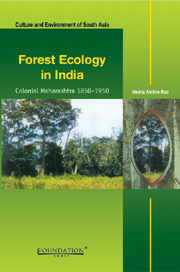Book contents
- Frontmatter
- Contents
- Preface
- Glossary
- Maps
- 1 Introduction
- 2 Pre-Colonial Maharashtra
- 3 Early British Management of Forests
- 4 Evolution of Forest Policy and Forest Acts of 1865 and 1878
- 5 Implementation of 1878 Act
- 6 Forest Policy During 1900–1950
- 7 People's Resistance
- 8 Conclusion
- Appendix - I
- Appendix - II
- Bibliography
- Index
1 - Introduction
Published online by Cambridge University Press: 26 October 2011
- Frontmatter
- Contents
- Preface
- Glossary
- Maps
- 1 Introduction
- 2 Pre-Colonial Maharashtra
- 3 Early British Management of Forests
- 4 Evolution of Forest Policy and Forest Acts of 1865 and 1878
- 5 Implementation of 1878 Act
- 6 Forest Policy During 1900–1950
- 7 People's Resistance
- 8 Conclusion
- Appendix - I
- Appendix - II
- Bibliography
- Index
Summary
Human life being closely dependent on the natural resource base for its survival, conservation and exploitation of natural resources has been an age-old phenomenon. However, the quality and magnitude of this exploitation is a derivative of factors such as the level of contemporary technology, population, demand pattern, and socio-cultural attitudes of the society towards nature at different points of time. Indian society has not been an exception to this. A number of foreign invasions and the consequent integration of migrant groups from other civilisations into Indian society influenced and altered its approach towards the exploitation of its natural resource base.
However, the real transformation of the use of resource base on an unprecedented scale and magnitude began with the advent of British modern times. With the Industrial Revolution in their homeland, the main task of British administrators in India was to expropriate India's natural resources for their own imperial demands that were dictated by their military and commercial interests. A revolution in the use of resources following industrialisation enormously enlarged the possibilities of resource transformation from one form to another and their transportation over long distances. The Industrial Revolution created a zest among human beings, particularly from the West, to conquer nature. India being one of the richest colonies of the British in terms of its natural resources was an obvious target for the fulfillment of their rapacious greed. The legitimacy needed to appropriate the resources in the colonies was secured by passing several laws. The constitution of the Forest Department and the enactment of several Forest Acts were part of such attempts in colonial India.
The British systematically and legitimately exploited India's forests.
- Type
- Chapter
- Information
- Forest Ecology in IndiaColonial Maharashtra, 1850-1950, pp. 1 - 19Publisher: Foundation BooksPrint publication year: 2007



